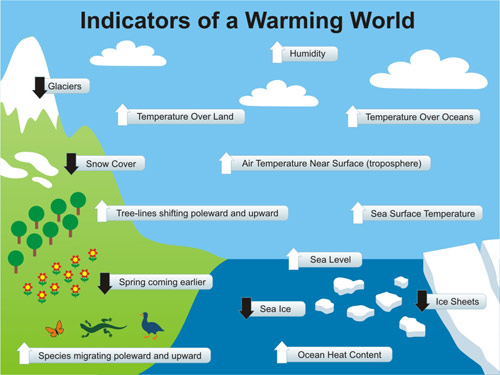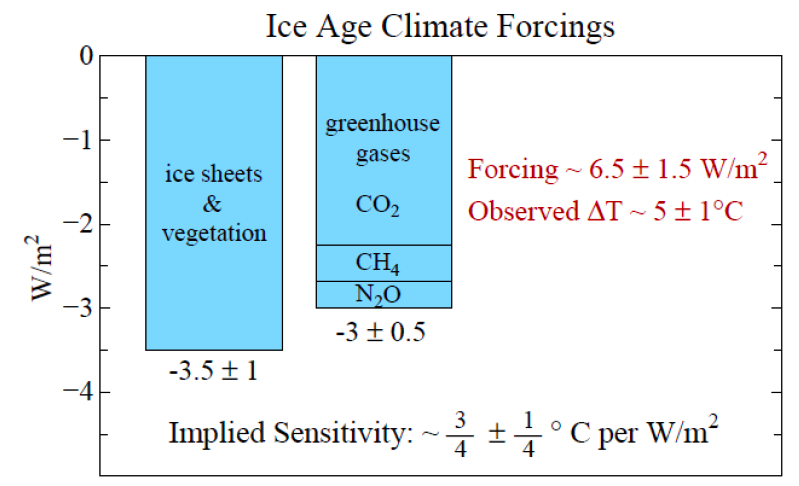SkS Responses to Pielke Sr. Questions
Posted on 21 September 2011 by dana1981
On his blog in response to our post One-Sided 'Skepticism, Roger Pielke Sr. asked SkS to respond to some questions. We would like to note that these questions are totally unrelated to the initial discussion initiated by Dr. Pielke's unsubstantiated criticism of SkS (see Chasing Pielke's Goodyear Blimp). However, in the interest of establishing what we hope will be a productive discourse, we have agreed to answer Dr. Pielke's questions.
Dr. Pielke's questions are underlined in the text below, and the answers from SkS follow.
1. Of the two hypotheses below, which one do you conclude is correct? (see Dr. Pielke's post for the two hypotheses offered)
The two aren't mutually exclusive, and both are correct. CO2 is the dominant radiative forcing causing the current global energy imbalance.
2. Of the two perspectives below [from Mike Hulme], which one do you agree with? (see Dr. Pielke's post for the two perspectives offered)
Again, the two perspectives are not mutally exclusive, and both are correct. As Hulme notes, they are simply two different framings. In terms of climate policy, the second framing is probably more appropriate, as addressing climate change will involve more than just CO2 emissions reductions.
3. What is your preferred diagnostic to monitor global warming?
SkS doesn't have a preferred diagnostic - all lines of evidence must be taken into account. It's important to look at all the data in totality to monitor global warming (surface temperature, ocean heat content, atmospheric temperature, TOA energy imbalance, sea level rise, receding ice, etc.).

What is your best estimate of the observed trends in each of these metrics over the last 10 years and the last 20 years?
10-year trends are generally not statistically significant (see Santer et al. 2011, for example). The approximate best estimate observed trends for some of these metrics over the last ~20 years are as follows. TLT: 0.18°C per decade. Surface temperature: 0.18°C per decade. Ocean Heat Content (OHC) upper 700 meters: 6.3 x 1022 J per decade. Sea level rise: 32 mm per decade. Arctic sea ice volume: -2900 km3 per decade. Glacier mass balance: -180 mm w.e. per decade.
4. What do the models’ predict should be the current value of these metrics?
The surface temperature change is roughly consistent with model predictions, though perhaps a bit on the low end. The predicted TLT trend is approximately 0.26°C per decade. Sea levels are rising faster and Arctic sea ice is declining far faster than models predict.
OHC in the upper 700 meters increased more than the models expected from 1961 to 1999, and has increased less than models project since 2003. There are a number of factors that may explain the recent discrepancy:
- as noted above, this is too short of a timeframe for a valid statistical evaluation;
- models generally do not take the increases in aerosol emissions over this period into account;
- there is a wide range of estimates of upper 700 meter OHC trend since 2003, varying by nearly two orders of magnitude; and
- the oceans are much deeper than 700 meters, and the so-called "missing heat" may very well reside in the deeper oceans (i.e. see Meehl et al. 2011).
We have discussed this subject previously here and more recently here, taking the deep ocean into account.
One reason that we like to rely on multiple lines of evidence, rather than depend on one single indicator, is that any one can be wrong. The history of the UAH measurements comes to mind: the measurements were in conflict with other methods for tracking temperature change (and with climate model projections) for over a decade; eventually, most of the discrepancy was resolved (in favor of the models) only after very subtle analysis of the physical behavior of the instruments.
5. What are your preferred diagnostics to monitor climate change?
That depends on how "climate change" is defined, but again, it is necessary to look at all lines of evidence and data.
6. Is global warming (and cooling) a subset of climate change or does it dominate climate change?
Again, that depends on how "climate change" is defined. Long-term global temperature and climate changes are both ultimately caused by global energy imbalances.
Now that we have answered your questions, there are a few issues on which we would like to understand your perspective, Dr. Pielke.
SkS Questions for Dr. Pielke
1. Approximately what percentage of the global warming (increase in surface, atmosphere, ocean temperatures, etc.) over the past 100 years would you estimate is due to human greenhouse gas emissions and other anthropogenic effects? And the past 50 years?
2. Do you find Spencer, Lindzen, and Christy's arguments that equilibrium climate sensitivity is in the ballpark of 1°C or less for doubled atmospheric CO2 plausible? If so, how do you reconcile this low climate sensitivity with the paleoclimate record, for example needing to explain ~5°C swings in average global surface temperature between glacial and interglacial periods (i.e. see the figure below from Hansen and Sato 2011)?

3. Do you agree that continuing on our current business-as-usual emissions path presents an unacceptable (in your opinion) risk to the biosphere and to human society in general within the next century?
4. Do you agree that continuing on our current business-as-usual emissions path presents an unacceptable (in your opinion) risk to marine ecosystems in the form of ocean acidification within the next century?
5. Do you think that we should begin to move towards a low-carbon economy, thereby reducing anthropogenic GHG emissions?































 Arguments
Arguments






























and reflect. I obviously did not say that one should not permitted the peer-reviewed literature, in fact what you say is the opposite of my point. I very clearly spelled out why on must in fact DO that (i.e., consult the body of knowledge, understanding and science). People reading your comments on this thread would think that there are very few people working on land surface processes, and land-atmosphere feedbacks, and that you are one of those few. That is most certainly not the case. Or do you disagree with that fact?[DB] Albie is a big-leaguer and we at SkS are very fortunate to have him here as a Forum member and participant.